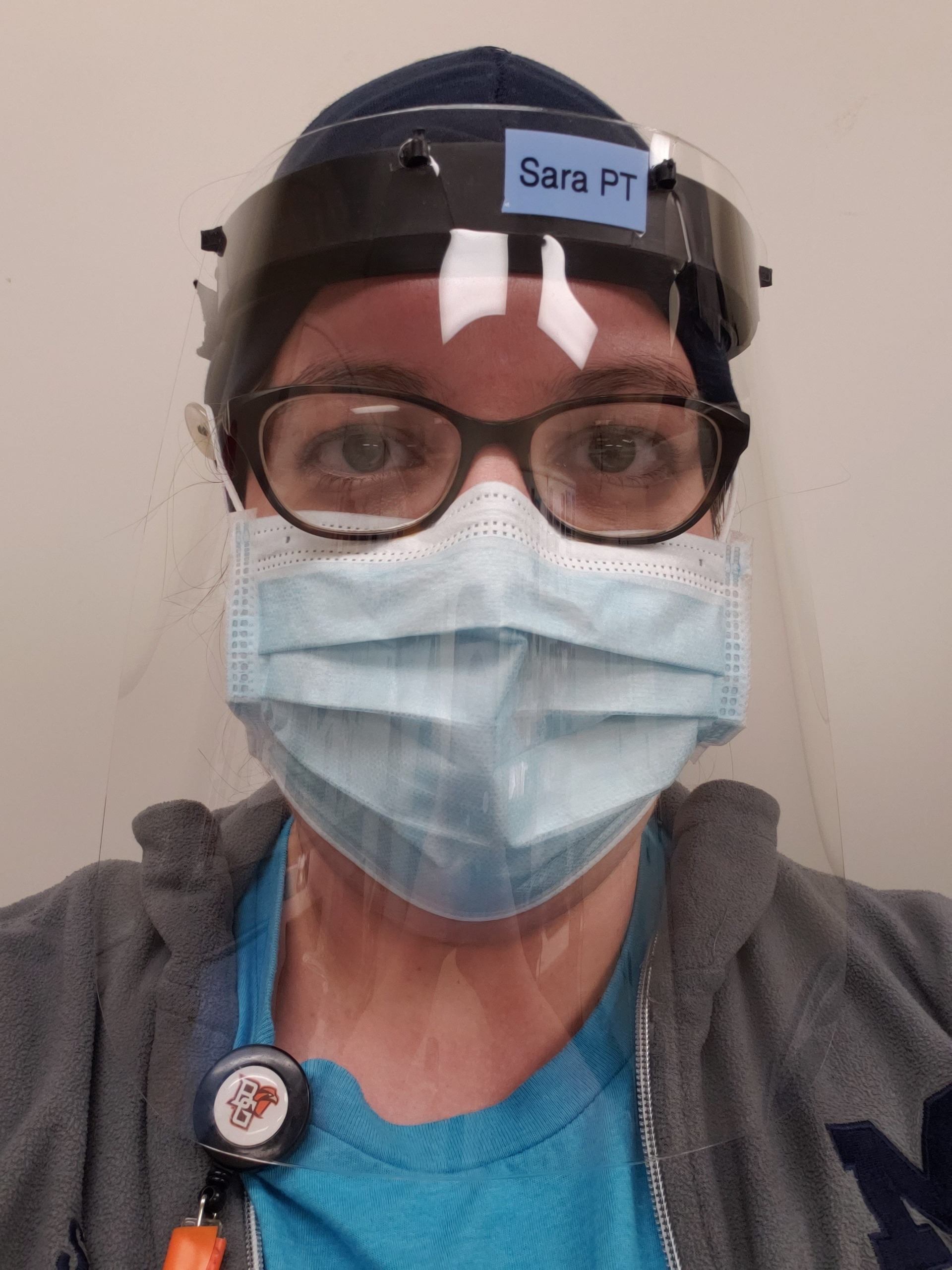BGSU alumna plays critical role in helping COVID-19 patients recover

Sara Houlihan ’09 has important, challenging role as physical therapist at Michigan Medicine
By Anne-Margaret Swary
When Sara Houlihan ’09 began her career as a physical therapist, she was excited to help people by getting them back to their lives and activities after illness or injury. She never imaged she would be on the front lines of a worldwide pandemic one day.
But as a clinical specialist based in Ann Arbor, Michigan, that is where she has found herself in recent weeks as COVID-19 cases have spread throughout the state. Physical therapists have an increasingly important and challenging role to play as patients recover from coronavirus.
“Before COVID-19, I was spending a lot of time on the general medicine floor doing direct patient care,” said Houlihan, who graduated from BGSU with her applied health science degree and is employed with Michigan Medicine at the University of Michigan. “Our team works with patients to get them up and mobile. We help them increase their strength, endurance, balance and overall functional health, as well as assess their home setup before they are released.”
But as the number of COVID-positive cases began to grow throughout the hospital, it became all hands on deck.
“We’ve transferred a lot of sick patients from the Detroit area because we luckily had a significant number of ventilators and ICU beds available as they were running out,” she said.
During the early stages of coronavirus’s spread throughout the state, she was focused on helping get healthy patients stabilized and get them home to eliminate their exposure risk and also free up beds as more units of the hospital were converted to COVID floors. But as COVID-19 cases skyrocketed, her priority shifted to providing therapy to patients as they recovered from the virus.
“We have had over 100 percent increase in patients that are COVID-positive since this started,” she said. “Now that patients are getting to the recovery phase, our work is very important.”
Patients who have been on a ventilator intubated and sedated for weeks at a time are incredibly weak as they emerge from their illness, she said. COVID patients in particular seem to have intense ICU-acquired weakness — more so that ordinary ICU or ventilator patients.
“The trickiest thing that we’re running into is that there’s not one ‘normal’ thing we’re seeing in COVID; it affects everyone differently,” she said. “Some of these patients are fatigued just from sitting up for a few minutes. They also have unique issues that arise from needing to be prone, or on their stomachs, for so long to help aerate their lungs.”
The other challenging aspect of Houlihan’s work during the pandemic is helping families of coronavirus patients prepare to care for their loved ones once they are released from the hospital.
“A lot of my job is family training, and with the visitation restrictions we have in place, I’m not able to meet with families face-to-face and give them that critical discharge information first-hand,” Houlihan said.
So, like many workers across the world, she’s transitioned to video chats and phone calls from patient hospital rooms to provide critical post-care training in most cases. But there’s also the patients whose entire families have been affected by coronavirus, and no one remains well enough to help them when they get home.
“We also don’t know what kind of outpatient physical therapy is going to be available to them, so we are also trying to create exercise programs and outpatient physical therapy plans for our patients to do at home to ensure they are successful in their recovery,” Houlihan said.
Her work these days impacts every aspect of her life. From the deep marks etched on her face from face shields at the end of the day, to the new routine she must follow when she gets home to minimize carrying germs inside. Her parents have even taken over care of her dog temporarily so she doesn’t have to worry about finding time to walk her or keeping her out of the “contaminated” area of her house where all dirty hospital clothes and even her lunch box is kept. She only drives her car to work to minimize any cross-contamination.
Through it all, she tries to remember lessons she learned during her time at BGSU about connecting with people and overcoming adversity.
“Even in the midst of this pandemic, I still love what I do because I love what I’m able to help people,” she said.“It’s scary, but it’s also great to meet that challenge and that need, and know that we are helping people.”
For those who know Houlihan, it’s no surprise she has risen to the challenge.
“I met Sara when she was on campus in 2018 as a 10 Under 10 honoree, and I was impressed by the intensity of her commitment to her profession,” said Dr. James Ciesla, dean of the BGSU’s College of Health and Human Services.
“Sara has had remarkably accomplished career for such a recent graduate,” he added. “It didn’t surprise me to learn that she was involved right in the thick of the pandemic — working directly with hospitalized acute COVID-19 patients — given the commitment she has shown to her career and to her alma mater.
“Sara doesn’t do anything halfheartedly. She is a true representation of the Falcon spirit. We are so proud of her.”
Updated: 04/30/2020 09:26AM
